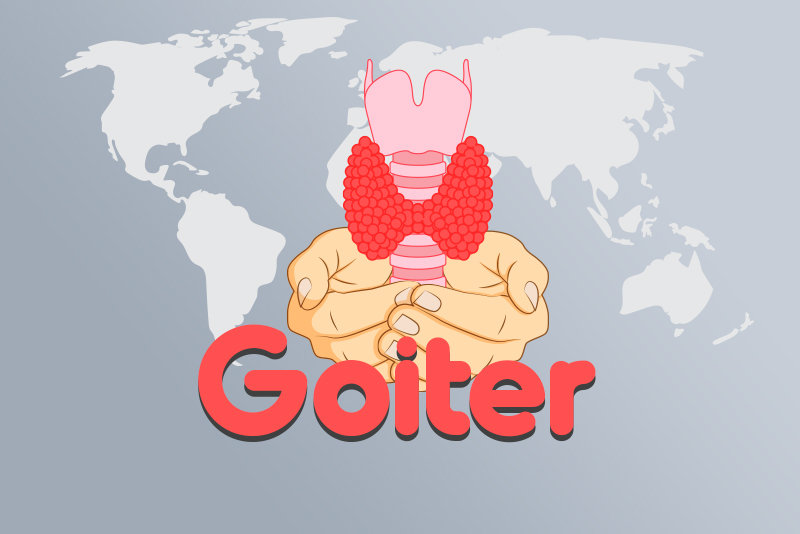The thyroid gland is a butterfly-shaped gland located at the base of the neck. Goiter is irregular growth or overall enlargement of the thyroid gland. The condition may be associated with no change in thyroid function or with an increase or decrease in thyroid hormones. It may significantly impact the way the thyroid functions. Endocrinologists and other specialists who treat patients with this disorder need to report diagnosis and treatment procedures on claims using the correct medical codes. Physicians can ensure accurate claim submission by partnering with an experienced endocrinology medical billing and coding company.
It is estimated that goiters are prevalent in about 5 percent of people in the United States. The risk of developing a goiter increases with age and is more common after age 40. Though this thyroid disorder can develop in anyone, it is about four times more likely to develop in women. People suffering from metabolic syndrome, obesity and insulin resistance are more likely to develop goiter. Exposure of the head and neck to radiation and having a family history of thyroid disease also increases the risk of developing a goiter. Iodine deficiency is considered one of the most common causes of goiters worldwide.
Iodine deficiency makes it harder for the thyroid gland to produce hormones, causing the gland to grow larger. Other conditions that influence thyroid function or growth include Hashimoto’s disease, Graves’ disease, inflammation, pregnancy and thyroid cancer. Treatment will depend on the type of goiter and its causes and symptoms. A mild goiter that is not noticeable and does not cause any specific problems does not usually require treatment.
Types of Goiter
Generally, a goiter may not cause complications, though its appearance may be troublesome or embarrassing for some people. A large goiter may obstruct the airway and voice box. There are different types of goiters –
- Colloid goiter (endemic) – This type develops due to the lack of iodine – the mineral essential to the production of thyroid hormones.
- Nontoxic goiter (sporadic) – The exact cause of this type of goiter is unknown. In certain cases, it is caused by the use of medications like lithium.
- Toxic nodular or multi nodular goiter – This type of goiter forms in one or more small nodules as it enlarges. The nodules produce their own thyroid hormone, causing hyperthyroidism.
Symptoms
Swelling in the neck is one of the primary symptoms of a goiter. Other symptoms include –
- Difficulty swallowing or breathing
- Coughing
- Weight loss
- Rapid heartbeat (tachycardia)
- Muscle weakness
- Increased sleepiness
- Increased sensitivity to heat/cold
- Hoarseness in the voice
- High blood pressure
- Excess sweating
- Dizziness when raising arm above the head
Don’t let billing issues slow down your practice.
Contact Us now and experience hassle-free billing and coding!
Diagnosis and Treatment
Diagnosing a goiter will begin with a physical examination of the neck to detect an enlargement of the thyroid, an individual nodule, or multiple nodules. Diagnostic tests such as thyroid scan, blood tests, ultrasonography and antibody tests are used to confirm diagnosis. For severe cases, a biopsy will be recommended where samples of thyroid nodules (if present) will be taken and sent for detailed laboratory examination.
Treatment will be based on the size and condition of goiter and associated symptoms. If the goiter is small and the thyroid function is healthy, the physician may adopt a wait-and-see approach with regular checkups. Treatment modalities include a combination of medications, radioactive iodine treatment and surgery. If the thyroid gland grows too large or does not respond to medication therapy, surgical removal of the thyroid gland, known as thyroidectomy will be recommended. Patients may also need to take thyroid hormone replacement therapy, depending on the amount of thyroid removed.
ICD-10 Diagnosis Codes for Goiter
Endocrinology medical billing and coding can be challenging. Endocrinologists treating different types of goiters need to use the correct medical codes for accurate documentation. Outsourced coding and medical billing services, healthcare practices can ensure accurate claims submission for optimal reimbursement.
The ICD-10 codes for goiter are:
- E04 Other nontoxic goiter
- E04.0 Nontoxic diffuse goiter
- E04.1 Nontoxic single thyroid nodule
- E04.2 Nontoxic multinodular goiter
- E04.8 Other specified nontoxic goiter
- E04.9 Nontoxic goiter, unspecified
The outlook for goiter depends on its type and its relative causes. A simple goiter is an enlargement of the thyroid gland, and usually not a tumor or cancer. If the thyroid continues to enlarge, it may compress the surrounding structures and may cause difficulty in breathing and swallowing and hoarseness. Treatment is necessary when a goiter causes troublesome symptoms that impact health.





